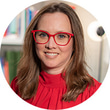- OT
- Professional support
- AOP
- Rewind and reboot
Rewind and reboot
Optometrist Ceri Smith-Jaynes prepares to become a student all over again after deciding to pursue a further IP qualification

25 August 2016
The last time I did any real studying was at university as an undergraduate and during my pre-registration year. I had few commitments or responsibilities outside the realm of qualifying as an optometrist. My brain was limber and sucked in facts like a thirsty sponge. There was no smartphone and no Netflix – no one to look after except me. The distractions were minimal compared to today’s information overload.
Sixteen years after qualifying, I have decided to become a student once more. Can my brain still do it? Can I find enough time while working in practice and attending to the needs of a business and my family? We shall see, as I have applied to Aston University to study Independent Prescribing for Optometrists.
In my area, Lancashire, we used to have a minor eye conditions service (MECS)-type shared care scheme. It was very successful but, when the contract came up for renewal, optometry was unfortunately beaten to the post by a community ophthalmology service."I see optometry's future in therapeutics. America went down this path years ago; they are all therapeutically qualified and, frankly, I'm a bit jealous. Some are even doing injections and laser treatments"
I decided we’d never get the service back if the workforce couldn’t prove that we were up to the job. So, I did my MECS exam. This was partly to take a run at doing exams again and partly to get the badge sewn on my sleeve, just in case.
Besides, we do still see minor eye conditions, but when the presenting symptoms are not technically general ophthalmic services eligible, we offer to see the patient privately if they don’t wish to go to their GP or walk-in centre.
THE PATH TO THERAPEUTICS
- Complete a distance learning course in Independent Prescribing for Optometrists from a General Optical Council-approved institution
- Complete a clinical placement (equivalent to 24 three-hour sessions) under the supervision of an ophthalmologist, and keep a log book to submit to the College of Optometrists. You will need to have been practising in the UK and registered with the GOC for two full years before beginning the clinical placement
- Pass the College of Optometrists’ common final assessment, an exam of multiple-choice questions.
Total costs will vary but are in the region of £2500-£3000, not factoring in time out of practice.
Ophthalmologists are increasingly in demand from our ageing population for the really difficult things like surgery, and have little time for minor conditions. If optometrists wish to establish themselves as the first port of call for eye problems, we need to have the skills to manage many of these problems ourselves. We most certainly have the equipment.
Optometrist 2.0
Technology is moving forward and I fear that if I don’t upgrade myself now, I’ll be left behind. We rely so heavily on selling eyewear in our business model that we could easily crumble if eyewear as we know it were to become obsolete.
For example, all those varifocals could disappear if Google develops practical, wearable nano-technology that projects all the information one needs at infinity. What if refractive surgery were to come up with a ‘cure’ for presbyopia? With new drug therapies for myopia and keratoconus in the pipeline, I’ll need to be able to prescribe soon. It will also take me a couple of years to qualify.
I do worry about the added level of responsibility. I’m hoping that the university course will give me the confidence I need, but there is bound to be a sleepless night after prescribing my first treatment, a 2am wrangle over whether I got it right. But if you want to differentiate yourself and your practice, offer something that can’t be bought online and future proof your practice, I believe this is one way to do it.
Advertisement


Comments (0)
You must be logged in to join the discussion. Log in